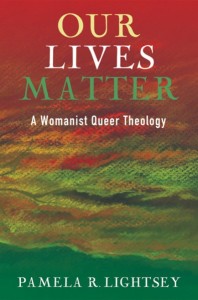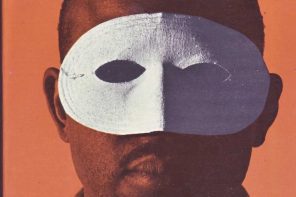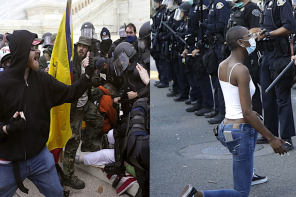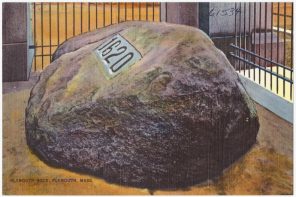How does being a member of an oppressed class affect the way a person perceives God? How has the church been helpful or harmful in the lives of LGBTQ black women? As Boston U. professor, activist and clergyperson Pamela Lightsey writes, “a question can be both powerful and dreadful,” and her questioning is what compelled her to write her latest book, Our Lives Matter: A Queer Womanist Theology.
I first met Rev. Dr. Lightsey when I was a graduate student at a Forum for Theological Exploration conference. In this conversation about her new book, we talk about the Black Lives Matter movement, its connection to queer womanist theology, and her transformative experiences on the ground in Ferguson and Baltimore.

Our Lives Matter: A Womanist Queer Theology
Pamela Lightsey
Pickwick Publications
(September, 2015)
Your new book is Our Lives Matter: A Womanist Queer Theology. Can you explain the notion of queering and how it connects to theology?
I actually taught a class in a church, a queer theology class, and a student asked, “Queer and theology, do those two go together?” And as we walked through the class over the course of the semester, she got to understand why they do.
Now the word “queer” has a history behind it, some painful history behind it, for those within the LGBTQ community. That history has to do with lesbians and gay persons being called queer in the pejorative sense. Today that term has been embraced, not by all, but by quite a few. Persons within the community self-identify, and by self-identifying they say they don’t want to be put into a box. They don’t want to use these binary categories of male and female, straight or homosexual.
So when one says queer nowadays, one is intentionally pushing back against the binary conversations that often happen when we’re talking about ourselves. Persons who self-identify as queer want to indicate that they understand their identity and their sexuality to be far more complex than an “either/or” situation.
In a theological sense, this lets us look at the ways we understand the doctrines of our faith. My context is Christian, so if I look at some of the doctrines of the Christian faith, I’ll begin to think about the conceptualizations we have about God and to think of ways to describe God in ways that may not necessarily fit the normative conversation—but are nonetheless true.
If I were to say that God is queer, what I’m saying, in essence, is that God cannot be boxed.
Your book engages with the work of a number of womanist scholars. Talk a little bit about how you are using the term “womanist” and how it relates to theology.
I use the term “womanist” to privilege the narratives of black women in my research. So throughout my book I’m privileging the narratives of black, lesbian, queer, trans women. I want to think about faith itself more broadly. In the book, I’m trying to construct for the readers a sense of the faith that is beyond the normative articulations and that embraces [LGBTQ black women] for their wholeness as human beings, as sexual persons, in a way that is celebratory and in a way that strongly asserts their sacred worth.
That’s important because in many spaces the well-being and sacred worth of black queer women, black lesbian women, black trans women is not a positive thing. In some ways the book is a love narrative to them to say “Yes, God loves you, and this is why God loves you theologically.” It is me talking about God and the goodness of God and the being of God in a way that helps them to see themselves in that framework.
In the first sentence of the preface to your book, you state, “I am a Black queer lesbian womanist scholar and Christian minister.” Why is it important for you to state that up front?
To come out in black communities, to come out in the Christian church, even to come out in some womanist circles has not been a easy thing to do. I identify in these ways so that the reader understands that I’m taking a very serious stand. I’m saying: this is who I am. How I identify is not fully embraced by all people, but I am here. I exist. I won’t allow my existence to be erased by the politics of the church, by the ideologies of the black community or even by what some in academia regard as good intellectual reflection.
I am particularly careful to say “queer lesbian” because I want members within my context to understand my identity in ways that term “queer” simply cannot express alone. There are many people in the black community who don’t quite understand what this term “queer” means, but they really do get it when I say I’m a lesbian.
Your book is entitled Our Lives Matter. There has been an All Lives Matter backlash to the Black Lives Matter movement. Whom do you mean to include in “Our Lives Matter?”
In the book I’m specifically speaking about black, lesbian, trans women—and I’m also writing from my experience of being in the Black Lives Matter movement, in Ferguson and in Boston and in Baltimore.
That experience was really great for me because two of the founders of the hashtag movement identify as queer black women. But there has been some pushback questioning who those black lives that matter are. My book is a response to that, to say that the black lives that matter include lesbian, trans and queer women.
If it does not include us—if it does not include the full LGBTQ community who are black—then let us not say that black lives matter.
In the book, you share your reflections on being a clergyperson and an amateur journalist in Ferguson, Missouri following the fatal shooting of Michael Brown by Officer Darren Wilson. Can you talk about your own participation in Black Lives Matter and in Ferguson specifically?
I decided to go to Ferguson because I grew up in the ’60s and consider myself a child of the Black Power movement. I’m also a veteran of the United States Army and a mother of a child who was on the ground in the “shock and awe” days in Iraq. My son is a veteran, and I myself am a veteran. So you imagine the challenges that I had when I saw our police forces being militarized on the streets of Ferguson, and I saw civilians running from tear gas.
As a veteran and as a womanist and as a child of the ’60s Black Power movement, I knew that I could no longer comfortably sit in my office in Boston and be at my home in Boston and not try to give some voice or utilize my skills as a scholar and as someone who is acquainted with the military.
So I flew to Ferguson. I tried to tell the story through my lens. I shot livestream from Ferguson, and it was really a major shift for me because I had never done this kind of journalistic work before. But I had a couple of journalists from Reconciling Ministries Network who were there supporting my desire to cover what was happening on the ground. They understood that I didn’t want to simply capture what was happening but that I wanted to participate in what was happening and lend my support to the activists on the ground.
Younger Black Lives Matter activists have criticized some clergy for their conservative emphasis on “peace and calm.” What should be the role of faith communities and clergy leadership in combating social injustice including police violence?
When I was in Ferguson I saw some of that criticism. There is a type of peace that really is violence—peace that is controlling is not peace. This control is part and parcel of the power structures we see throughout our nation—and I daresay throughout our global world—that is used against oppressed persons.
So some of the clergy, not all, were criticized for their involvement with trying to control the crowds and ensure peace on any given night.
I do think clergy and faith communities ought to have an immediate role in the work to combat injustice, and by “immediate,” I mean they need to be on the streets. They need to be participating in protests. They need to be supportive. They need to be listening ears to young activists.
Some clergy have done that exceptionally well. I’m thinking especially about Traci Blackmon, who was in Ferguson and St. Louis. I’m also thinking about Willis Johnson and Starsky Wilson who were also in that area. These clergy have been integral parts of Black Lives Matter and integral parts of the protest against militarized police and excessive police force against citizens in the Ferguson area. There are other clergy nationally who have been involved, and I think that needs to continue.
I don’t think this is a time when clergy can just sit by and only preach sermons and feel that is the extent of their involvement. On the other hand, I recognize that not all clergy can be on the ground, but if they can lend their support to the movement they ought to do that. This a matter of justice, and clergy ought to be at the forefront of any justice movement.
Following the acquittal of George Zimmerman in the fatal shooting of Trayvon Martin, the Black Lives Matter hashtag was created by three Black women, two of whom are queer. Yet, their leadership is not often acknowledged. What has been the role of Black women and queer Black women in the Black Lives Matter movement?
The Black Lives Matter movement as I have experienced it has a number of queer black women on the ground doing the work. It also has trans women and trans men on the ground doing the work. They are part of the leadership. As you know the Black Lives Matter movement is a “leaderful” movement, and that is to say that not one or two persons are in charge of any action but that the movement itself very beautifully recognizes and utilizes the gifts of people in various locations. So it’s leaderful and that’s the way it should be.
Despite the leadership of queer black women in the Black Lives Matter movement, when you look at the talking heads on television very often those people are black men and not black women. The movement is really asserting the role of black women and black queer women. When you think of the Say Her Name campaign, it was particularly developed so that the nation would remember that black women are also victims of excessive police force. We don’t want their lives or their work to be erased. We want it kept in the forefront.
Black Lives Matter has tended to focus on the Black men and boys who have been injured or killed. The Say Her Name campaign was started to draw attention to the Black girls and women who have suffered police violence such as Rekia Boyd and Sandra Bland. How have Black women historically been erased from social justice activism?
When we talk about Black Lives Matter, we’re talking about all black lives. What has often taken place is that social media has lifted up the men and responded to that violence in ways that it has not responded to violence against black women. Fortunately, pushback has started, and Say Her Name is a direct result of understanding that not enough attention has been given to the lives of black women like Rekia Boyd, like Sandra Bland.
Janelle Monae’s Hell You Talmbout addressed police violence, and it has been re-recorded by Vita Elizabeth Cleveland as Hell Y’all Ain’t Talmbout to include Black transgender persons. How has the “T” in LGBTQ been treated in police brutality protests?
I have not heard this new version by Vita, so I’m very interested in hearing it. And it’s correct. I try to address that in my book, because I recognize we’ve not given enough attention to the police violence against transgender persons—and we’ve not given enough attention to the violence that happens to black trans women at the hands of black heterosexual men. As a queer lesbian woman, I recognize that I only have part of the picture. I’m not transgender, so I don’t experience the world in the same way as my transgender brothers and sisters do. But I do try to speak out against that oppression, and I just don’t think we do enough of that.
What do you hope that readers of your book will take away from reading it?
I hope that they will see that I tried to write a book because I love the LGBTQ community, because I love my black community, and I’m trying to work against the intersections of oppression against both these communities. I hope they receive it as a theological response, as my way of combating the homophobia within the Christian church that too often oppresses LGBTQ persons.
I really hope that young persons will read it and will take courage from it. I’ve heard from a number of young LGBTQ persons, black especially, who thank me for the book and said they have wanted a resource like this for some time to combat some of the negative statements that they hear on the regular basis, particularly within the churches, within the churches that they love.
I’m telling them to not receive that putrid narrative that God doesn’t love you into your being. Know that God loves you and loves you very strongly, and here is theological writing that will help you to understand that love and inspire you to do the work against social injustice in our world.
What new projects are you working on?
That’s a good question. I often lay in bed thinking about the research I want to continue to do. In my womanist research, I’m still trying to pull out what it means to be black and LGBTQ in the world today. I’m really curious as to how faith impacts the LGBTQ community to do social justice work. How does your faith influence your activism? That’s the next step I want to take. I also want to continue working in the Black Lives Matter movement, but I’m also rolling around in my head how to bring the intersections of oppression more vividly to the forefront in my next work. Where you find one oppression, you will find other oppressions, and I want to speak to that.





